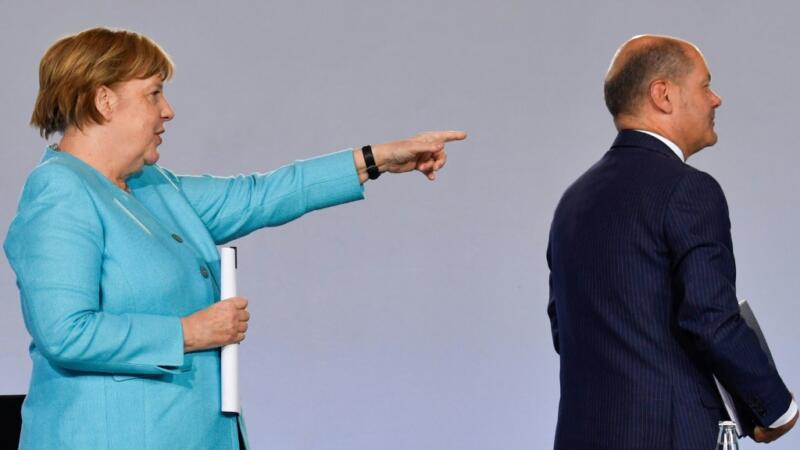German divisions on show over new virus stimulus package
German Chancellor Angela Merkel points to Finance Minister Olaf Scholz after announcing the new stimulus package. (AFP photo)
Talks on a fresh round of stimulus measures to reboot Germany’s post-coronavirus economy looked set to stretch into Wednesday, as party leaders in Chancellor Angela Merkel’s coalition wrangled over controversial issues including subsidies for the vital car industry.
Many of the roughly 60 items on the agenda fall along familiar political fault lines, with Merkel’s conservative CDU favouring tax cuts and other pro-business measures, while the centre-left Social Democrats (SPD) prefer one-off payouts to families and support for struggling local governments.
“All the details have to be discussed carefully” with talks “to be continued Wednesday,” CDU spokesman Hero Warrings tweeted on Tuesday.
The government aid programme under discussion could total up to 80 billion euros ($89 billion), according to the top-selling Bild daily.
The fresh stimulus would come on top of a massive 1.1 trillion euro rescue package already agreed in March, comprising loan guarantees, subsidies and a beefed-up shorter-hours programme to avoid job cuts.
“We will decide a support programme that helps the economy to find its feet and grow again,” Merkel said in a weekly video podcast Saturday, urging “a boost to innovation and sustainable growth”.
But support for Germany’s auto sector has emerged as a key bone of contention, with environmentalists and politicians from across the spectrum saying any incentives to encourage car purchases should be for clean vehicles only.
Industry bosses and regions that are home to major automakers however are pushing for a cash-for-clunkers scheme that also covers diesel and petrol-powered cars.
Around 2,000 anti-fossil fuels demonstrators formed a human chain through Berlin’s government district Tuesday as the government talks kicked off.
The youth environmental movement “Fridays for Future” meanwhile said it had organised some 60 protests nationwide, with demonstrators asked to wear masks and keep their distance in line with coronavirus-fighting measures.
“We demand an economic stimulus package that strengthens the society of tomorrow,” tweeted Luisa Neubauer, Germany’s leading Fridays for Future figure.
– Green eyes at France –
But calls for Berlin to do more to help Germany’s powerful car sector, which employs 800,000 people, grew louder after French President Emmanuel Macron last week pledged eight billion euros to help French carmakers transition towards electric vehicles.
“It can’t be that France is spending eight billion euros supporting the car industry, while we spend nine billion on (airline group) Lufthansa — and not for the keystone of our economy,” conservative heavyweight Markus Soeder told weekly Welt am Sonntag.
The Bavarian premier’s state hosts major carmakers BMW and Audi, while SPD-run Lower Saxony state is similarly fighting for support for Volkswagen.
But politicians in Berlin remain sceptical.
The influential Ifo economic institute on Monday said that while past cash-for-clunkers schemes had “enlivened sales for a short time… the bottom line is that there is no evidence in most studies that more cars were sold” overall.
Carl Martin Welcker, president of the VDMA machine-tool makers’ federation — another key industry — argued that a car bonus would “discriminate” against other sectors.
– Tax cuts or handouts? –
Other proposals aimed at speeding up Germany’s economic recovery include the SPD’s plan for a one-off “family bonus” of 300 euros per child, which has received a lukewarm reception from Merkel’s CDU party.
They prefer ideas such as forgoing Berlin’s share of local business taxes or investing in digitisation of government bureaucracy.
SPD Finance Minister Olaf Scholz has also revived a pre-pandemic idea for the federal government to take over the debts of struggling local governments, so far rejected by conservatives.
There is however widespread agreement among the coalition partners to bring forward the abolition of Germany’s “solidarity tax” which was introduced to cover the cost of the country’s reunification in 1990.
Tom BARFIELD
Disclaimer: Validity of the above story is for 7 Days from original date of publishing. Source: AFP.


